Because potatoes can be time consuming and laborintensive to cook, it’s no surprise that there are several kitchen gadgets out there designed to help streamline the cooking process.
Perhaps one of the most helpful is a potato ricer—a device composed of two plates pierced with holes designed to quickly mash cooked potatoes into fine pulp.
While useful in many recipes, not everyone owns a potato ricer or has room for one in their kitchen.
That’s why we’ve compiled this list of five top alternatives so you can still make delicious mashed potatoes without breaking your bank balance or increasing cupboard clutter!
Read on for our definitive guide to alternative potato mashing methods and learn which options work best in different situations.
What is Potato Ricer?

A potato ricer is a kitchen utensil used to make uniform, mashed potatoes quickly and easily.
Essentially, it’s a manual masher that will separate the potatoes into smaller pieces before they are mashed.
The potato ricer is also useful for making other dishes, such as gnocchi and smooth purées.
It’s easy to use, easy to clean, and an affordable tool for any kitchen.
The device itself is a cylinder with several small holes on the bottom held by a handle attached by a hinge at one end.
To operate the potato ricer simply press the handle down to force cooked potatoes through the holes into uniform pieces in another container below (like a bowl or plate).
Ricers come in different sizes and can be made from stainless steel or uncoated aluminum; some models may also have interchangeable discs with various sized holes for different textures of mash.
Potato ricers vary in price and design but will generally feature some form of hinged metal frame containing one or more metal discs with different sized holes.
The bottom of the frame is placed over a bowl or pan and the cooked potatoes are put inside the frame.
A handle on top of the frame is then pressed downward, forcing the cooked potatoes through the disc holes and into tiny rice-like pieces in the bowl below.
Though potato ricers come in a variety of styles, each will typically feature a removable disc for cleaning ease.
Many also feature two discs for creating two distinct sizes of rice, and some models may even contain three discs for creating finer textures more suitable for preparing sauces or baby food.
Potato ricers are usually made from durable materials such as stainless steel or cast iron and can be found at most kitchenware shops or online stores.
5 Best Potato Ricer Alternatives You Should Try
1 – Potato Masher
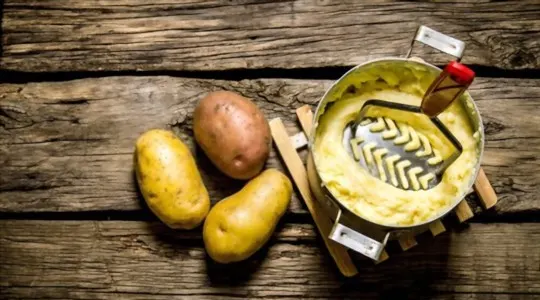
A potato masher is perhaps the most common and familiar of the various types of potato ricers.
It is remarkably simple: a metal or plastic masher head, often with wires or teeth extending from it.
It functions much like a large fork – you push down and make a mashing motion to create mashed potatoes from cooked potatoes.
Potato mashers are relatively inexpensive and easy to use, but are somewhat limited in their capacity for creating fluffy mashed potatoes.
Furthermore, because the mash is made by pressing potatoes against something with wires or teeth, skin can easily get stuck in the crevices.
For those reasons, potato mashers should not be considered an ideal substitute for a potato ricer; however, they can certainly do an adequate job with consistent results when one isn’t available for purchase.
2 – Food Mill
A food mill is a versatile kitchen tool that can be used in place of a potato ricer for many recipes.
Food mills are typically outfitted with multiple disks with perforated holes of different sizes, giving it the ability to “mill” or finely grind food.
This makes them great for puréeing cooked potatoes and squash, removing the skins and seeds from sauces, soups and stews, and turning other ingredients into sauces without worrying about chunks.
It’s also an easy way to mash boiled potatoes without mashing them too much and creating potato glue.
Food mills can range from small handheld versions to larger tabletop versions, so they make a great addition to any kitchen.
3 – Mortar and pestle
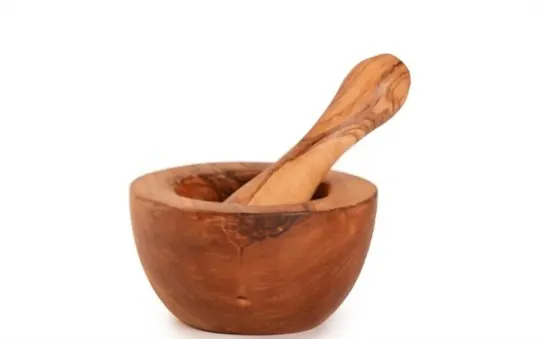
Mortar and pestle is a classic kitchen option instead of the potato ricer.
This kitchen tool is typically made of hardwood, granite or marble, but it may also come in ceramic or glass if you prefer.
To use a mortar and pestle, place small amounts of cooked potatoes into the mortar (a bowl) and use the pestle (a type of rolling pin) to mash them up into fine particles.
The benefit to using this traditional tool is that it does not require electricity and works as an effective potato masher.
However, because it requires small batches at a time and uses quite a bit of manual labor, it may take more time than other options on this list.
4 – Fork and Spoon
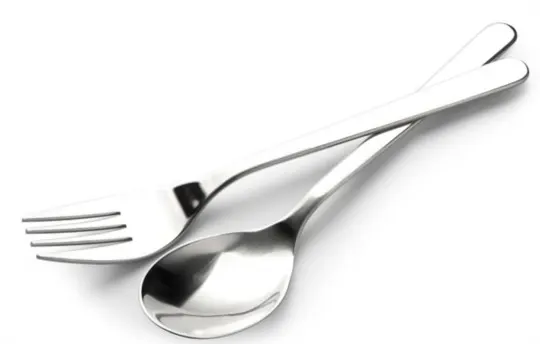
Fork and spoon is the simplest and most economical alternative to a potato ricer.
It involves manually mashing boiled potatoes with a fork or spoon in a bowl.
The results are not as smooth as those of a ricer, but it is the fastest way to get the job done.
To mash potatoes by hand using this method, first you will need to boil potatoes until they are completely soft.
Use pieces of butter, salt and white pepper for seasoning, then place in a warm bowl and start mashing with either the back of a fork or your spoon.
Continue by folding in small chunks of butter and stirring vigorously until you achieve the desired texture.
5 – Cheese Grater
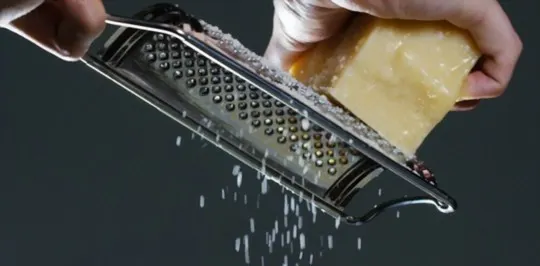
Cheese graters are great for ricing potatoes, as well as a variety of other items.
The sharp metal teeth mean that your potatoes will be nice and fine after you grate them.
The advantage of a cheese grater is that you can use it for multiple purposes, whereas a potato ricer is limited.
The disadvantage is that these graters can sometimes require more effort to use than the other options listed below.
It’s also important to note that safety should always be considered when using a cheese grater as the sharp edges can be dangerous if you are not careful.
Conclusion
A potato ricer is a great tool to have at home if you like to explore your culinary imagination, but it’s not the only way to make mashed potatoes or other dishes.
There are several useful alternatives that can give you the same results with some advantages and disadvantages compared to a potato ricer.
Whether it’s a simple masher, a food mill, an immersion blender, a Chef’n mush masher or a food press, any of these utensils can help you get the perfect consistency for your mashed potatoes no matter what shape or size the potato is.
While each has its pros and cons, it comes down to personal preference and which device will best suit your needs.
So don’t be afraid to experiment before deciding which tool works best in your kitchen.
Frequently Asked Questions
What is a Potato Ricer?
A potato ricer is a kitchen tool designed to mash cooked potatoes into a fine, fluffy texture.
The ricer consists of a hopper, handle, and grater plate.
By pressing the handle, the potato is forced through the grater plate, creating a light and fluffy texture.
What are some alternatives to a Potato Ricer?
Some alternatives to a potato ricer include a potato masher, food mill, handheld blender, or a food processor.
Depending on the desired texture, each of these tools can be used to mash, puree, or blend cooked potatoes.
What are the 5 best alternatives for a Potato Ricer?
The 5 best alternatives for a potato ricer are a potato masher, food mill, handheld blender, food processor, and immersion blender.
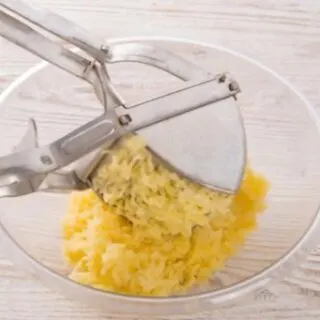
5 Best Potato Ricer Alternatives You Should Try
Ingredients
- 1 – Potato Masher
- 2 – Food Mill
- 3 – Mortar and pestle
- 4 – Fork and Spoon
- 5 – Cheese Grater
Instructions
- Choose your preferred substitute from the list of options.
- Organize all of your ingredients.
- Use the proper substitute to cook your recipes.

Carrie is a food writer and editor with more than 15 years of experience. She has worked for some of the biggest names in the food industry, including Bon Appétit, Food & Wine, and Martha Stewart Living.
As the Editor in Chief of IntroChicago.com, Carrie oversees all of the content on the site. She also manages the team of contributing writers and editors, who help to create delicious recipes, helpful tips, and informative articles that you’ll find on the site.
A native of the Chicago area, Carrie is passionate about all things food. She loves trying new restaurants and experimenting with new recipes in her kitchen. She’s also a graduate of the Culinary Institute of America, so she knows a thing or two about food!
